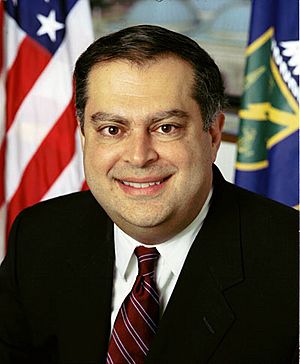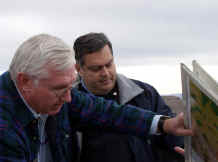Spencer Abraham facts for kids
Quick facts for kids
Spencer Abraham
|
|
|---|---|

Official portrait, 2001
|
|
| 10th United States Secretary of Energy | |
| In office January 20, 2001 – January 31, 2005 |
|
| President | George W. Bush |
| Preceded by | Bill Richardson |
| Succeeded by | Samuel Bodman |
| United States Senator from Michigan |
|
| In office January 3, 1995 – January 3, 2001 |
|
| Preceded by | Donald Riegle |
| Succeeded by | Debbie Stabenow |
| Chair of the Michigan Republican Party | |
| In office 1983–1991 |
|
| Preceded by | Melvin L. Larsen |
| Succeeded by | David J. Doyle |
| Personal details | |
| Born |
Edward Spencer Abraham
June 12, 1952 East Lansing, Michigan, U.S. |
| Political party | Republican |
| Spouse | Jane Abraham |
| Education | Michigan State University (BA) Harvard University (JD) |
| Awards | Lebanese National Order of the Cedar (Commander Class) |
Edward Spencer Abraham (born June 12, 1952) is an American lawyer, writer, and politician. He was the 10th United States secretary of energy from 2001 to 2005. He worked under President George W. Bush.
Spencer Abraham is a member of the Republican Party. Before becoming Secretary of Energy, he was a U.S. Senator for Michigan. He served in the Senate from 1995 to 2001. He also helped start the Federalist Society. This group focuses on law and public policy. He also co-founded the Harvard Journal of Law & Public Policy.
Contents
Early Life and Education
Spencer Abraham was born in East Lansing, Michigan. His mother, Juliette Elizabeth (Sear), was involved in Michigan politics. He graduated from East Lansing High School.
He is of Lebanese background. He is married to Jane Abraham, and they have three children. Spencer Abraham earned a law degree (J.D.) from Harvard University. He also graduated from Michigan State University in 1974. While at Harvard Law School in 1978, he helped create the Harvard Journal of Law & Public Policy. This journal later became linked with the Federalist Society.
Political Career
Before he was elected to the Senate, Spencer Abraham taught law. He was a professor at Thomas M. Cooley Law School.
Leading the Republican Party
Spencer Abraham was chosen to lead the Michigan Republican Party. He served as chairman from 1983 to 1990. From 1990 to 1991, he worked for Vice President Dan Quayle. He was a deputy chief of staff.
Later, he co-chaired the National Republican Congressional Committee (NRCC). This was from 1991 to 1993. In 1993, he ran to become chairman of the Republican National Committee. He finished second in that race.
Serving in the U.S. Senate
Abraham was elected to represent Michigan in the United States Senate in 1994. He served one term, until 2001. He lost his reelection bid in 2000 to Debbie Stabenow. He was the only Lebanese American serving in the Senate at that time.
During his reelection campaign, he faced strong criticism. Some groups ran negative advertisements about his views on immigration. He had supported making some immigration rules less strict. In 1996, he played a key role in stopping proposed cuts to legal immigration. He also received an award for his work on immigration. Another reason for his defeat was his vote during a major trial involving President Clinton in 1999.
Committee Work and New Laws
As a Senator, Abraham worked on several important committees. These included the Budget, Commerce, Science and Transportation, Judiciary, and Small Business Committees. He also led two subcommittees: Manufacturing and Competitiveness, and Immigration.
He helped create several important laws. One law set up rules for online contracts and signatures. Another law aimed to reduce government paperwork. He also helped pass a law protecting Internet domain names. This law helps businesses and people against copyright and trademark infringements. In 1999, he supported a bill to change how the U.S. Department of Energy worked. This bill would have also changed how the country's oil reserves were managed.
U.S. Energy Secretary

In 2001, President George W. Bush chose Spencer Abraham to be the Secretary of Energy. He held this important position until February 1, 2005. On November 15, 2004, he announced he would step down. His successor was Samuel W. Bodman.
In 2004, the Lebanese Ambassador gave Abraham a special award. It was called the National Order of the Cedar.
After Government Service
From 2005 to 2007, Abraham was a special guest at the Hoover Institution. This is a research center at Stanford University. After leaving government, he started his own company. It is called The Abraham Group. This company helps with international business and strategy.
In 2007, he also worked as an advisor for Fred Thompson's presidential campaign.
Later Career and Writings
In 2006, Spencer Abraham became the Non-Executive Chairman of AREVA Inc. This is the American part of a French nuclear energy company. This company plans to build nuclear power plants in the United States. It also works on converting nuclear materials into fuel.
With William Tucker, Abraham wrote a book in 2010. The book is titled Lights Out!: Ten Myths About (and Real Solutions to) America's Energy Crisis.
In 2016, Abraham was elected to the board of trustees for the California Institute of Technology.
Images for kids
See also
- List of Arab and Middle-Eastern Americans in the United States Congress
- List of Harvard University politicians
 | Mary Eliza Mahoney |
 | Susie King Taylor |
 | Ida Gray |
 | Eliza Ann Grier |



